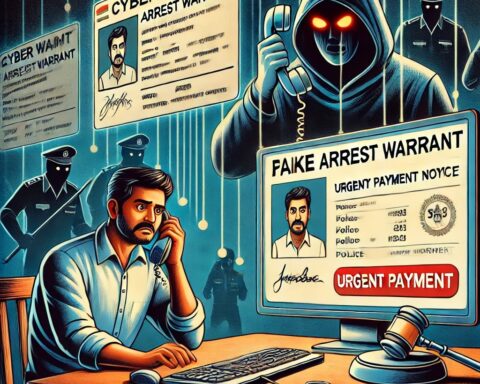New Delhi/ TNF
In a shocking case of cybercrime, cyber fraudsters posing as CBI officers duped S.P. Oswal, Chairman and Managing Director of the Vardhman Group and a Padma Bhushan awardee, of ₹7 crore. Oswal, a prominent figure in the textile industry, revealed the full story to NDTV, detailing how the scammers used fake virtual courtrooms and forged documents, even impersonating Chief Justice of India D.Y. Chandrachud, to carry out the fraud. The incident has led to the arrest of two cybercriminals, with the Ludhiana police recovering ₹5.25 crore from them.
How the Scam Unfolded
The scam began on September 28, when Oswal received a phone call warning him that his phone would be disconnected unless he pressed ‘9’. Upon doing so, a voice claimed to be calling from the CBI’s Colaba office in Mumbai, informing Oswal that a mobile connection had been taken in his name through fraudulent means. The caller further alleged financial irregularities associated with a Canara Bank account, which Oswal did not hold.
The scammers falsely linked Oswal’s identity to financial misconduct related to the former Chairman of Jet Airways, Naresh Goyal, who was arrested in a money laundering case. They claimed that an account in Oswal’s name was being used in the investigation involving Goyal. Despite Oswal’s protests that he had no knowledge of the account or Goyal, the scammers insisted that his Aadhaar details had been misused to open the account.
Digital Arrest and Fake Court Hearing
The scammers escalated the fraud by placing Oswal under what they called a “digital arrest,” telling him he was a suspect and could not leave his house until the investigation was completed. To make the ruse more convincing, they used a video call to simulate a fake courtroom setting, complete with a person impersonating Chief Justice D.Y. Chandrachud. Oswal was told that this “court” had issued an order against him, which was then sent to him via WhatsApp.
The fraudsters, who identified themselves as Chief Investigation Officer Rahul Gupta and others, sent Oswal a set of nearly 70 surveillance rules to follow during the so-called investigation. They even requested a priority investigation letter from Oswal and asked for detailed personal information, including his childhood, education, and business background.
Oswal, placed under 24/7 video surveillance by the scammers, was told that his movements were being monitored and that he could not discuss the case with anyone due to the supposed involvement of the National Secrets Act. The fraudsters threatened Oswal that any disclosure could lead to a prison sentence of three to five years for both him and anyone he spoke to about the case.
The ₹7 Crore Fraud
The cybercriminals further convinced Oswal of their legitimacy by showing him fake ID cards, making it seem as though they were real CBI officers in civilian clothing. They even used AI-generated video and audio, along with a virtual backdrop displaying an office with the Indian flag, to simulate an official setting. During one of the video calls, Oswal was shown a fake courtroom, where an individual posing as the Chief Justice of India heard his case and issued an order.
The fake arrest warrant, which the scammers sent to Oswal, bore the forged signature of an Enforcement Directorate officer named Neeraj Kumar, identified as an assistant director of the ED. Using this fake warrant, they demanded that Oswal transfer ₹7 crore into various bank accounts to avoid arrest. Believing the scam to be genuine, Oswal complied and transferred the money, thinking it would help clear his name.
Police Investigation and Arrests
Ludhiana Police Commissioner Kuldeep Singh Chahal stated that two cybercriminals have been arrested in connection with the case. The police recovered ₹5.25 crore from them and are continuing their investigation to locate the remaining sum and apprehend other individuals involved in the fraud.
The Growing Threat of Cybercrime
This case is a stark reminder of the increasing sophistication of cybercrime, where fraudsters are using advanced tactics like AI-generated video calls, fake courtrooms, and impersonation of high-ranking officials to deceive even the most cautious individuals. Digital house arrests, where victims are held virtually and manipulated through fear, are becoming more prevalent, with scammers posing as law enforcement officers to create a sense of urgency and panic.
The authorities are urging people to remain vigilant, verify any claims made over the phone or via video calls, and report suspicious activities to law enforcement immediately. This case highlights the critical need for stronger cybersecurity measures and public awareness to combat the growing menace of cyber fraud.








